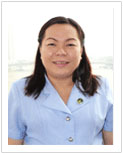Scientific Program

Kerada Krainuwat
Mahidol University, Thailand
Biography:
Kerada Krainuwat has completed her PhD from School Of Nursing, University of Wisconsin-Madison, USA. She is the Head of Public Health Nursing Department, Faculty of Nursing, Mahidol University, Bangkok, Thailand. She has been worked with community stakeholders and serves as an editorial board member of repute.
Abstract
NCDs are responsible for deaths and premature deaths worldwide. In Thailand, NCDs results in many serious health problems and decreased patients’ quality of life. This calls for an immediate action from all NCDs stakeholders to reduce adverse consequences from the diseases and restore quality of life for people with NCDs. Primary care nurse practitioners are one of the health care staff who create and deliver various types of health promotion and disease prevention interventions for patients with NCDs in the primary care settings. “3NO” is a health promotion and disease prevention intervention created to promote healthy diet consumption and reduce unhealthy diet consumption as well. The main idea of the intervention is to reduce the excessive sugar and salt intake for patients, at risk groups, and general population in the community. The “3NO” consists of 3 different actions. The first NO is no consumption of sweeten drinks and beverages, such as soda, concentration fruit and vegetable juice, 3 in 1 mixed coffee and tea. The second NO is any dips served with fresh sweet fruit. The final NO is no extra salt, including fish source, soy source, or additives, added in cooked food, ready to eat meal, or a La Crete. The “3NO” has been implemented at a sub-district local health promoting hospital at Nakhonpathom province in 2011 for feasibility test. This intervention has been accepted by community stakeholders and others. It also supports the health promotion concepts in terms of building a healthy public policy, creating a supportive environment, and strengthening community action to promote healthy lifestyle and reduce the adverse effects of NCDs on people. Today, the “3NO” is upgraded to an excellence model for health promotion and disease prevention, and the intervention has been expanded to many local health departments. The local health promoting hospital has been promoted as a center for teaching-learning center for health promotion and disease prevention for nurses and other health care professions.
- Healthcare
- Clinical Simulation
- Surgical Simulation
- Medical Simulation
- Simulation in Nursing
- Critical & Emergency Care
- Healthcare and Nutrition
- Simulation in Ophthalmology
- Simulation in Dentistry
- Brain Simulation
- Occupational Healthcare
- Alternative Healthcare

